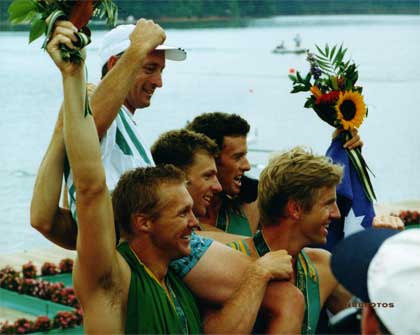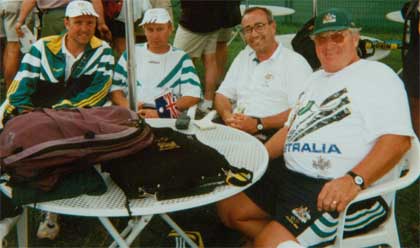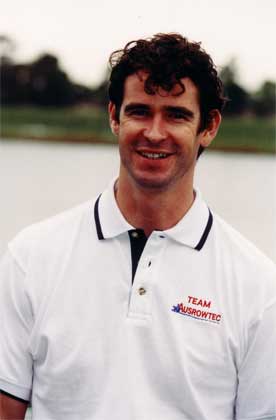History of Mercantile Rowing Club
Table of Contents
Chapters
- The River Yarra
- Early Rowing in Victoria
- The Beginnings (1880-1890)
- Mercantile in the Nineties (1890-1900)
- Sloan, Ivens and Fluctuating Fortunes (1900-1910)
- Dark Days and New Dawn (1910-1920)
- Years of Mixed Success (1920-1930)
- Through the Thirties (1930-1939)
- The Struggle for Survival (1939-1946)
- Building for Success (1946-1950)
- Mercantile to the Melbourne Olympics (1950-1956)
- Rowing to Rome (1956-1960)
- A Pink Cloud on the Horizon (1960-1965)
- The Storm and its Passing (1965-1966)
- A Clear Light Blue Sky (1966-1968)
- High Noon (1968-1970)
- A New Challenge (1970-1973)
- Fire and the Second Building Project (1973)
- Winds of Change (1973-1976)
- The Close of the Century (1976-1980)
- The Base for Success (1980-1984)
- Success (1984-1988)
- Oarsome Foursome (1988-1992)
- A Boathouse for the Best (1992-1996)
- The Rise of the Professional Coach (1996-2000)
- Golden Girls (2000-2005)
Appendices
25. The Rise of the Professional Coach (1996-2000)
Chapter Twenty-Five page 1 2 3 4 5
Overview
What a way to start a new Olympiad! Both Australian rowing and Mercantile Rowing Club were experiencing success at the highest levels. Some said that it was as good as it gets.
Australia was not only the most successful rowing nation in the world but also the most successful nation at the Olympic regatta. Mercantile was well represented at that regatta. Club members James Tomkins, Mike McKay, Drew Ginn and coach Noel Donaldson captured gold in the coxless four. Furthermore, it was a race from behind on an outside lane after a poor semi-final. It was a sensational race.

1996 Olympic Champion Men's Four with Coach
l-r Noel Donaldson, Michael McKay, Drew Ginn, Nick Green & James Tomkins
Rebecca Joyce, who had moved to Sydney some years earlier, won bronze in the women's lightweight double scull.
Georgina Douglas raced in the women's eight which finished fifth.
Ben Dodwell, Brett Hayman (cox) and Peter Murphy (emergency) were in the men's eight and Andrew Guerin managed the team.

1996 Olympic Games
l-r Paul Thompson - coach Olympic Champion Women's Pair, Noel Donaldson - coach Olympic Champion Men's Four, Andrew Guerin - Team Manager, Reinhold Batschi - Head Coach
Club member Dick Garrard was also prominent in coaching the American women's pair to silver behind the Australian pair. What a regatta for both Australia and Mercantile. The parties both in America and at Mercantile were unbelievable.
It was fortuitous that all these rowers continued until 2000. However Drew Ginn had to withdraw shortly before the 2000 Games with a severe back injury denying him an almost certain Olympic Championship being reigning world champion from 1999.
The next Olympic Games were on home turf in Sydney and the both sport and the public were focused heavily on that event. All eyes would be on rowing to achieve similar success in 2000 as occurred in 1996. Interest was also centered on the completion and testing of the Sydney International Regatta Centre.
Mercantile was to form a significant part in the 2000 Olympic Games with Michael McKay and Brett Hayman taking silver in the eight, James Tomkins and Matthew Long taking bronze in the pair, Ben Dodwell taking bronze in the four, Georgina Douglas finishing fifth in the final in the scull and Katie Foulkes taking a fifth placing in the eight.
Locally, the Yarra River was partially closed for a long period whilst the Burnley tunnel was created then covered. It was perhaps the last straw for big regattas on the Yarra River. The need for fairer straight courses and the growth of usage of pleasure craft on the river had all but destroyed the Yarra as a regatta venue. Two years of construction work was perhaps the final moment in a long demise. It had the benefit however of strengthening the usage of both the new Nagambie course and the decaying Carrum course.
The new Nagambie course was created during this period and officially opened on 8th March 1998. The course was created quite cheaply by moving soil from the land beyond the old short course during rare work on the Goulburn weir which meant the Nagambie Lake was lowered to a point to enable this to occur.
The 1998 National Championships were conducted on this new venue. Club member Patrick McNamara, who was also President of Nagambie Rowing Club, provided the desire and vision to enable the course to be built. His position as Deputy Premier of the State during this period was certainly of assistance. Former Rowing Australia CEO David Schier was also a key person in the course development from his position with Goulburn Water
Significant changes to the key people on Rowing Victoria also occurred. At the end of the 1997-98 season, club member Hubert Frederico retired as RV President after some 18 years as President. Other than for a short period during WWII, a non Mercantilian was to be a Rowing Victoria President for the first time since 1937. Long serving RV Secretary Bill Waterfield also retired at the same time. On the positive side, David Pincus continued as Executive Chairman of the Association and continued the strong administrative support of the Victorian Association by Mercantilians.
Another thing that changed was the short, but abrupt disruption to the dominance of Victoria in the King's Cup races in both 1997 and 1999. In 1997 an ACT crew comprising rowers from all States won causing a change to the rules of competition to make Interstate Championships a state of origin competition. The dominance was again disrupted in 1999 when an excellent Western Australian crew took the event. During this period, the King's Cup crew contained a high proportion of Mercantile members.
During early 1997, a strategic review of the Club was undertaken by Andrew Guerin, Simon Morrison and Richard Wraith which came up with some important conclusions and dispelled some other beliefs not backed up by facts and figures. Beyond the obvious conclusions regarding the importance of good coaches, there was the realization that professional coaching was required. Both work life and coaching demands had become too demanding to be able to manage for many volunteer coaches. Professional coaching was to become a key part of this and forthcoming Olympiads.
Peter Somerville became our first professional coach and helped define how an amateur administration should manage such a position and how a Club can best use a professional coach. It was an experiment which worked well and continues.

Peter Somerville - our first professional coach
It was certainly the period where professional coaches became prevalent and very influential. Locally the VIS coaches and MUBC employed coaches. The schools also employed many full time coaches. The professionals within the sport dominated the elite ranks and there was now a preference to use professional coaches in senior national teams. It is now difficult for amateur coaches to get coaching appointments.
A professional coach requires a stronger balance sheet, more members and greater reliance on donors. During this period the membership rose from 286 members in 1996 to 376 in 2000 — a growth of some 30%. Also during this period many members were prominent in their donations. A regular donor was Sean Colgan, our American resident member. This started with sets of oars which were collected from the American team by Andrew Guerin when he managed the Australian rowing teams. When Andrew stopped his term of team management, he sought cash donations from Sean instead. Sean happily agreed but placed conditions which benefited the Club enormously. These included that Andrew should match his donations and that other members also contributed. Habitual donors included Bob Aitken, Harry Mahoney, Andrew Evans, David Yunghanns, Steve Gillon and Jeff Lawrence. These endeavours were assisted by the creation of the equipment fund which enabled the Club to receive tax deductible donations.
David Boykett continued to champion the growth of the Endowment Fund which grew to $100,000 by the end of 1997 and $150,000 by 2000.
The key coaches in this period included Noel Donaldson, Richard Wraith, Peter Somerville, Simon Morrison, Paul Somerville, Anthony Bergelin, Matt Lovell and David Colvin. Special mention must be made of the continued strong influence of Noel Donaldson during this period. He coached many of our best athletes and his results are brilliant. He was a key influence throughout Victoria in his position of Head Rowing Coach of the Victorian Institute of Sport.
This period was also significant for the growth of women's rowing both within Australia and at the Club. Furthermore the Club had it's first women Captain in Celia Paterson who took over from Richard Wraith in March 1997 and continued until the end of the 1998 season. Her time as Captain gave considerable visibility to Mercantile as a women's club and a good place for women to row. This was to be seen in not too many years further on when Mercantile became the premier women's club in Victoria and possibly in Australia.
The club's administration also changed in other ways. David Boykett took the same view as his predecessor Bob Aitken in limiting the time President should stay in the position. He handed over to Andrew Guerin who in the end also stayed for a limited time.
As with any period of the Club's history, we lost some key members. Early in this Olympiad on 6th October 1996, we lost Lloyd Williams. A Rhodes scholar and scientist with an interest in high strength materials, he raced for Mercantile in the 1955 senior eight before retiring. He returned as a coach who introduced many scientifically based criteria for both talent identification and selection. His successful 1957 King's Cup crew contained many Club members. He was also a long term Victorian selector with Ron March of Richmond Rowing Club. He was involved in the formation of the Monash University Rowing Club and was it's first President. Later in life he started masters rowing and won gold in Canada. He made an outstanding contribution to both engineering and rowing.
Jim Bourke died in 1997 following a willing fight with cancer. Jim started rowing at Xavier College rowing in three first crews. He stroked a winning National Championships junior eight and two State senior eight championship eights. He also coached including the 1982 Xavier crew which contained Michael McKay.
Other prominent members to leave us were Jack Jones, Frank Fogarty and Bill Hidgecock.
